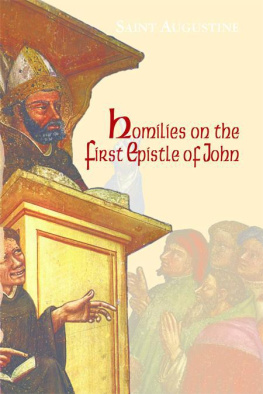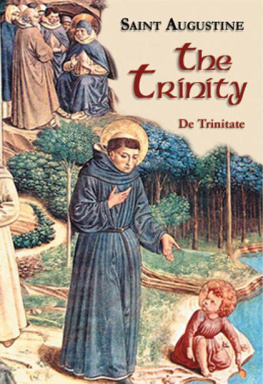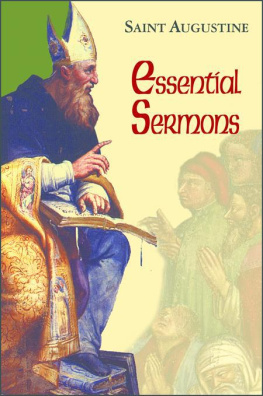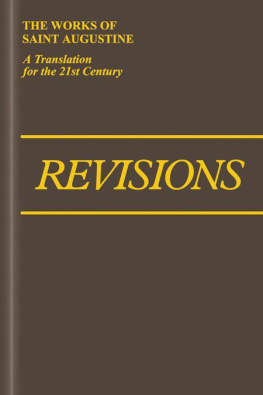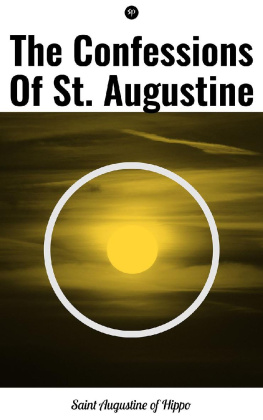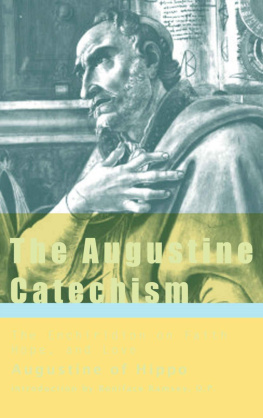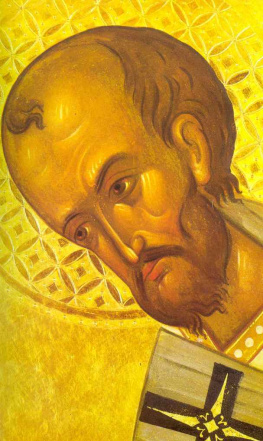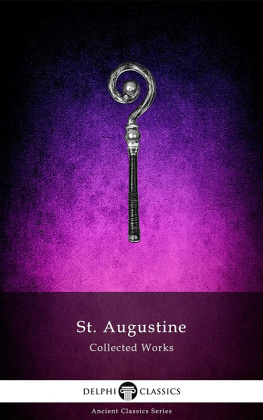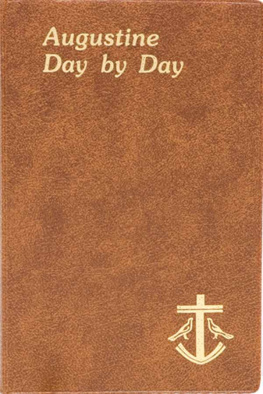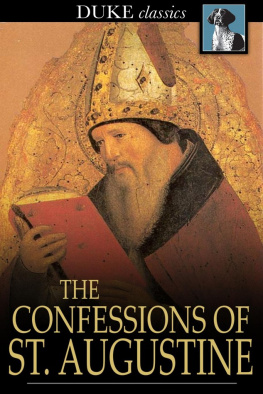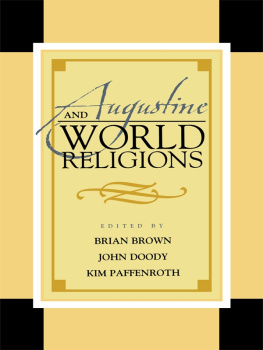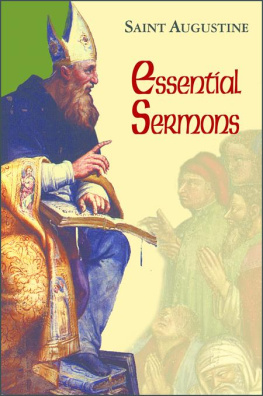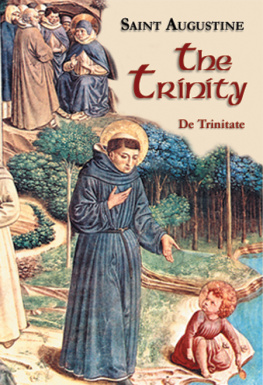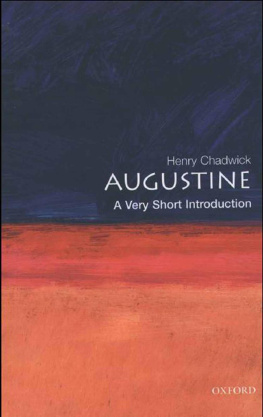Augustinian Heritage Institute, Inc.
www.augustinianheritage.org
Board of Directors
+John E. Rotelle, O.S.A. (1939-2002), founding director
| Michael T. Dolan | Daniel E. Doyle, O.S.A. |
| Joseph T. Kelley | Patricia H. Lo |
| Thomas Martin, O.S.A. | Jane E. Merdinger |
Boniface Ramsey
Translation Advisory Board
| Gerald Bonner | Maria Boulding, O.S.B. |
| Allan D. Fitzgerald, O.S.A. | Edmund Hill, O.P. |
| Joseph McGowan | Boniface Ramsey |
Roland J. Teske, S.J.
THE WORKS OF SAINT AUGUSTINE
A Translation for the 21st Century
Part III Homilies
Volume 14:
Homilies on the First Epistle of John
THE WORKS OF SAINT AUGUSTINE
A Translation for the 21st Century
Homilies on the
First Epistle of John
(Tractatus in Epistolam Joannis ad Parthos)
I/14
introduction, translation and notes by
Boniface Ramsey
(series editor)
editors
Daniel E. Doyle, O.S.A.
and Thomas Martin, O.S.A.
New City Press
Hyde Park, New York
Published in the United States by New City Press
202 Cardinal Rd., Hyde Park, New York 12538
2008 Augustinian Heritage Institute
Cover design by Leandro De Leon
Cover picture: Ottaviano Nelli, Saint Augustine preaches to the people
(Gubbio, Italy, Saint Augustine Church)
Library of Congress Cataloging-in-Publication Data:
Augustine, Saint, Bishop of Hippo.
The works of Saint Augustine. Augustinian Heritage Institute Includes bibliographical references and indexes. Contents: pt. 3, v .15. Expositions of the Psalms, 1-32
pt. 3, v. 1. Sermons on the Old Testament, 1-19.
pt. 3, v. 2. Sermons on the Old Testament, 20-50 [et al.] pt. 3,
v. 10 Sermons on various subjects, 341-400.
1. Theology Early church, ca. 30-600. I. Hill,
Edmund. II. Rotelle, John E. III. Augustinian
Heritage Institute. IV. Title.
BR65.A5E53 1990 270.2 89-28878
ISBN 978-1-56548-055-1 (series)
ISBN 978-1-56548-283-3 (cloth)
ISBN 978-1-56548-289-0 (paperb.)
Printed in the United States of America
For my friends
Princess Alexandra Schnburg
and Taki Theodoracopulos
with affection and gratitude
Contents
Introduction
Among Augustines most important homilies are the series of ten that he preached on the First Epistle of John during the course of Easter Week and for two days sometime after Easter Week (see IX,1). They were probably given in the evenings, when an audience would have had more leisure to listen to a longer sermon, And, while preaching on it, Augustine does in fact make a number of references to baptism, some more direct than others (I,5; II,9; III,1.5.12; IV,8.11-12; V,6-7; VI,10-11, VII,6.11), at least two of which (II,9; VI,10) can be construed as alluding to a recent event.
If these homilies are mystagogies, however, they are certainly not in the style of Ambrose or Cyril of Jerusalem, to name two of the most well-known examples, which is marked by a more or less systematic presentation of baptism. There are simply too few mentions of the sacrament, and none after the seventh homily. At no point is there an extended discussion of the baptismal liturgy, which was a central theme of the post-baptismal catecheses. Moreover, the homilies seem to presuppose listeners who are already experienced in the faith, whose most recent exposure to baptism was as onlookers rather than as recipients (see I,5; VI,10). It seems reasonable to conclude, then, that they are not mystagogical instructions. Neither are they like the many other sermons that Augustine preached during the course of Easter Week (224-260E, 375B), which are not mystagogical but which are nonetheless either at least partially directed to the newly baptized, or emphasize baptism or aspects of the Easter liturgy such as the singing of the Alleluia, or focus on the resurrected Christ and his appearances. There are two references to the Alleluia in the present homilies (V,7; VIII,1), it is true, but only the second of them is specifically paschal. There is no mention of the resurrected Christ or of the events associated with the resurrection that points to an Easter context and that would not fit just as well in a standard Sunday or weekday sermon. The conclusion must be, then, that Augustines Homilies on the First Epistle of John are merely sermons on a particular book of the New Testament that are by and large unrelated to the liturgical season in which they were preached.
In fact this is the earliest extended work, whether in the form of sermons or commentary, on this book of scripture that has survived to our day. It seems surprising that the prolific Origen, who produced a lengthy commentary on the Gospel of John early in the third century, wrote nothing on the epistle attributed to the same author. Diodore of Tarsus, who died in the 390s, was said to have commented on it, but, if that is the case, his writing disappeared without a trace. The famous Alexandrian exegete Didymus the Blind, who died a few years later than Diodore, apparently wrote a commentary on all three Johannine epistles, but there are no traces of it either.
As Augustine observes in his prologue, referring to the epistles leitmotiv, John said many things, and nearly everything was about charity. This was a theme that Augustine developed with frequency, and, in what seems to be his haste to get to it, by the end of his first homily he has already commented on about a fifth of the epistle, up to and beyond the place where John makes his first mention of love (2:5). It was also a theme that dovetailed with his Donatist preoccupations: Augustine saw the Donatist schism as, perhaps above all, a breach of charity.
A brief explanation of Donatism is owed here. At the very beginning of the fourth century, the Emperor Diocletian embarked upon a fierce persecution of his Christian subjects. One of the aspects of the persecution was the demand that copies of the Christian scriptures be handed over to the imperial authorities. Persons who gave up the scriptures in this way were labeled traditores traitors or betrayers or handers-over. Caecilian, the archdeacon of the Church in Carthage, where the persecution was particularly harsh, was accused of being a betrayer, as well as of having prevented food from being brought to Christians who were imprisoned for their faith. In 311 or 312 this same Caecilian was elected bishop of Carthage. Beyond his reputation, well-founded or not, there were a number of serious concerns regarding Caecilians episcopal ordination, perhaps the most significant of which was that one of the bishops who ordained him, Felix of Aptunga, was himself accused of being a betrayer. Augustine makes very general references to these events in his homilies (I,12; X,10). In 312, a council of bishops in neighboring Numidia declared Caecilian deposed, although he ignored them and did not step down, and elected a certain Maiorinus in his place. Maiorinus died soon after, and Donatus was then elected to replace him. Meanwhile the new emperor, Constantine, who was sympathetic to the Christian religion, was supportive of Caecilian, and in 316 he made a formal judgment in his favor. Subsequently Constantine imposed sanctions on the Donatists, as they were beginning to be called on account of Donatus, the usurping bishop of Carthage, who was a strong and clever leader. In 321, however, Constantine resigned himself to the existence of the Donatists, since they were increasing in numbers and, practically speaking, could no longer be repressed, and he instituted a policy of toleration in their regard.
At this point a schism had been in effect for about a decade. But now, thanks in part to the new policy of toleration, which allowed the Donatists to flourish unhindered, there were two bishopsone for the Catholics and another for the Donatistsnot only in Carthage but also in many other places throughout North Africa. During the course of the fourth century the Donatists themselves experienced division within their own ranks, but their bishops nonetheless numbered in the hundreds. When Augustine first confronted them theologically, toward the end of the fourth century, they were at the onset of a gradual decline in influence. A council held in Carthage in 411, in which Augustine played a key role and which was attended by more than 500 bishops, both Catholic and Donatist, accelerated the decline. There may have been some revivals after that, but Donatism appears for all intents and purposes to have died out with the Arab invasions of North Africa in the seventh century.
Next page
